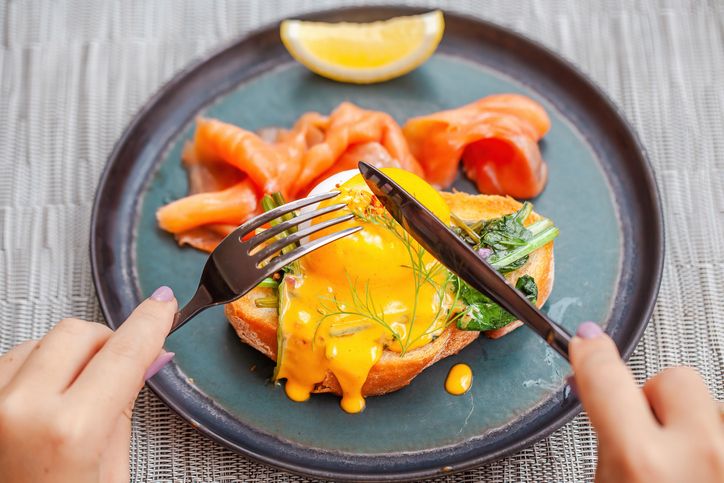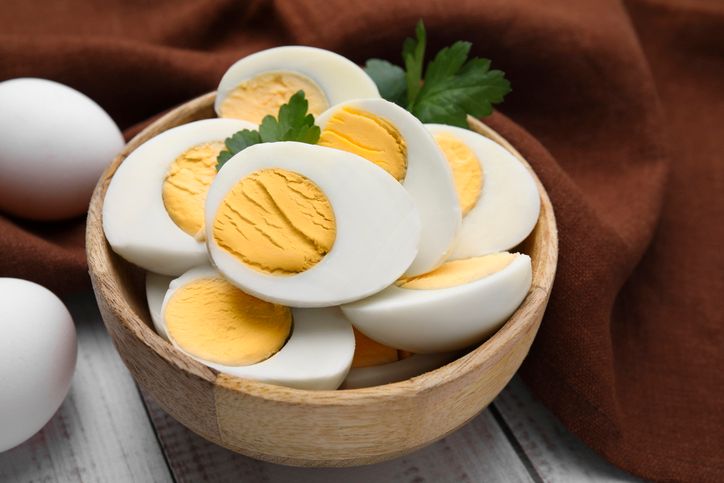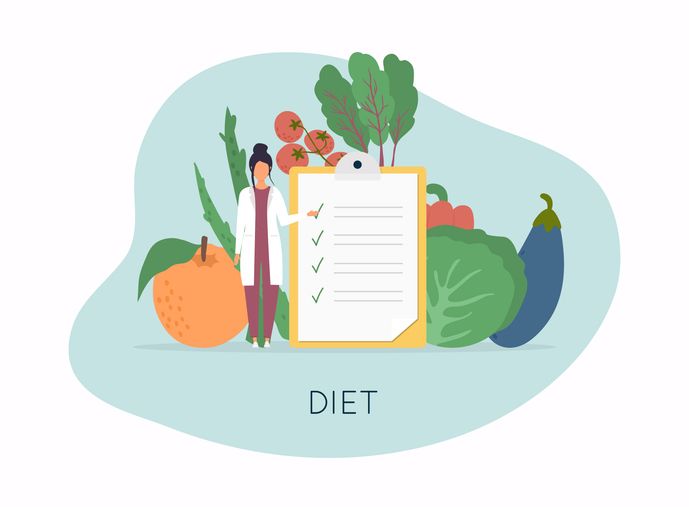
Author: Natalie Ng|Updated: 22 May 2025
You’ll accelerate your weight loss and boost your metabolism with the egg diet through seven simple but powerful effects. Eggs are rich in lean protein, low in calories, and packed with essential nutrients that help your body burn fat more efficiently while keeping you full. The egg diet is a short term eating plan built around eating eggs—usually boiled eggs—along with low carb vegetables, a few low carb fruits, and other foods like lean meats or healthy fats. It’s simple, structured, and cuts out starchy foods and processed snacks, which helps reduce cravings and supports a calorie deficit. If you’re looking for a straightforward way to lose weight quickly without overcomplicating your meals, keep going—we’re breaking down exactly how this diet works and why it might be a healthy choice for the right goals.

Egg Protein Helps Preserve Muscle During Weight Loss

Why lean protein in eggs supports your body
Eggs are a rich source of complete protein, which means they provide all the essential amino acids your body needs to build and repair muscle. Each large egg has around 6 grams of high-quality protein that’s easy for your body to absorb and use. That’s why the egg diet—especially plans that include at least two eggs per meal—can help protect muscle mass while you lose weight.
Importance of protein while eating in a calorie deficit
When you follow a low calorie or low carb diet, your body may start to break down muscle if it’s not getting enough protein. Muscle mass plays a big role in your metabolism, so losing it can slow down how many calories you burn each day. Adding boiled eggs or egg whites to meals is an easy way to give your body the protein it needs to hold onto that muscle.
Simple meal ideas to support muscle
A common boiled egg diet meal might include hard boiled eggs with leafy greens or low carb vegetables like bell peppers. Some egg diet plans include healthy fats like olive oil or coconut oil to help increase satiety. This way of eating helps keep you full, reduces cravings, and supports your metabolism without relying on processed foods or restrictive diets that leave you hungry.
Eating eggs regularly—especially as part of a balanced diet that includes other foods like lean meat, non starchy vegetables, and low carb fruits—can help you lose weight while keeping your body strong.

Eating Eggs Helps You Feel Full with Fewer Calories
Why low-calorie foods like eggs support weight loss
Eggs are low in calories but high in satiety, which means they help you feel full without needing large portions. One large egg has only about 70 calories, yet it offers a mix of complete protein and healthy fats that naturally help control hunger.
The impact of calorie density on your eating plan
Foods with low calorie density—like boiled eggs and non starchy vegetables—give you more volume for fewer calories. This makes it easier to stay in a calorie deficit without feeling like you're constantly cutting back. For example, two hard boiled eggs can keep you satisfied longer than a small portion of sweet pastries or fried snacks, even though they have similar calories.
Starting your day with eggs helps reduce overeating later
Eating at least two eggs for breakfast may help reduce the urge to snack later in the day. The protein in eggs slows digestion, keeping your energy steady and preventing blood sugar spikes that lead to cravings. When paired with low carb vegetables like spinach or bell peppers, they create a filling meal that supports both weight loss and blood sugar control.
Making eggs a regular part of your diet—especially during breakfast—can help you eat fewer calories naturally, while still meeting your nutritional needs. This makes the egg diet a simple, balanced approach for those looking to lose weight quickly without turning to restrictive diets that feel unsustainable.
Book Now to Experience
S6 Body Sculpting Treatment
1 Minute Self-Registration
Date should not be before minimal date

Low Carb Diet Structure Supports Fat Loss
Why cutting carbs helps your body burn fat
The egg diet often includes a low carb structure that limits starchy foods and processed carbs. By focusing on low carb vegetables, leafy greens, and lean protein like boiled eggs, your body shifts its main energy source from carbs to stored fat. This change can help you lose weight more effectively.
Gradual carb reduction is more sustainable
Rather than cutting all carbs at once, many people find it easier to reduce intake gradually. Start by removing sugary snacks and refined grains, then limit high carb fruits and starchy vegetables like sweet potatoes. Replace them with low carb fruits such as berries and non starchy vegetables like cucumbers and bell peppers. This helps keep your meals balanced while supporting fat loss.
Fewer carbs mean fewer energy crashes
A high egg diet paired with fewer carbs helps avoid the highs and lows that come with blood sugar spikes. By replacing toast or sugary cereal with eggs and vegetables, you’ll likely notice steadier energy and fewer cravings during the day. This kind of eating plan also makes it easier to stay within a calorie deficit without feeling deprived.
Keeping your meals simple—boiled eggs, low carb vegetables, healthy fats like olive oil or coconut oil—creates a structure that’s easier to follow than many restrictive diets. It supports steady fat loss while still giving your body the fuel it needs.

Eggs Provide Essential Nutrients for Metabolism
Nutrients in eggs support daily metabolic functions
Eggs aren’t just about protein—they also deliver key vitamins and minerals that support your metabolism. One large egg contains nutrients like vitamin D, B12, selenium, and choline, which play a role in energy production, hormone function, and overall health.
Importance of egg yolks in meeting nutritional needs
Most of these essential nutrients are found in the yolk. That’s where you’ll get vitamin D for bone health, choline for brain and liver function, and B vitamins that help convert food into energy. Eating whole eggs, instead of only hard boiled egg whites, gives your body access to these micronutrients in their most natural form.
Supporting metabolism without adding unnecessary calories
Despite being nutrient-dense, eggs are still low in calories. This means they deliver important vitamins and minerals without pushing you over your calorie limit. When you pair eggs with other nutrient-rich foods like leafy greens, low carb vegetables, or whole grains (in less strict plans), you're creating balanced meals that support your metabolism and help prevent weight regain.
Including eggs regularly in your egg diet plan supports more than just weight loss. It helps cover your daily nutritional needs, especially when following a short term diet where food variety might be limited. This makes eggs a reliable, nutrient-rich option for healthy people looking to lose weight while supporting their overall health.

Protein in Eggs Slightly Boosts Calorie Burn

The thermic effect of protein helps, but in a modest way
When you eat foods rich in protein—like eggs—your body uses more energy to digest them compared to carbs or fat. This is called the thermic effect. While it won’t drastically increase how many calories you burn, it does give your metabolism a small lift.
Why this boost still supports your weight loss goals
Digesting protein requires more effort from your body, which means you burn a few extra calories with each high-protein meal. Eating at least two eggs in a meal gives you around 12 grams of protein, and this slight increase in energy use helps support a calorie deficit over time.
Focus on the full benefits of protein-rich meals
Even if the thermic effect is small, the real benefit of eating eggs is how they work with your body to maintain muscle mass, control appetite, and prevent cravings. These are the factors that make a difference in real-life results, not just how many calories you burn while digesting food.
So while eating eggs won’t magically melt fat, they still support your weight loss plan by helping your body burn calories a bit more efficiently, all while keeping you full and satisfied.
Book Now to Experience
S6 Body Sculpting Treatment
1 Minute Self-Registration
Date should not be before minimal date

Eggs Help Stabilize Blood Sugar and Reduce Cravings
Why stable blood sugar supports better appetite control
High-carb meals, especially those with refined sugar or processed foods, often lead to spikes and crashes in blood sugar. This cycle can trigger hunger soon after eating. Eggs, on the other hand, have no sugar and are low in carbohydrates, which helps keep your blood sugar steady.
Protein and healthy fats keep you full for longer
The mix of protein and fat in eggs slows digestion, giving your body steady energy instead of quick highs and lows. This helps reduce sudden cravings and limits the urge to snack between meals. Starting your day with boiled eggs or fried eggs cooked in olive oil can keep you satisfied until your next meal.
Fewer cravings help you stay in a calorie deficit
By reducing sugar crashes, eggs help you avoid mindless snacking—one of the biggest barriers to weight loss. Instead of reaching for processed foods or carb-heavy snacks, having two eggs with non starchy vegetables like spinach or mushrooms gives you a filling meal that supports your eating plan and helps control your daily calorie intake.
This simple change not only helps with hunger but also supports your overall health by promoting better blood sugar regulation—an important factor in managing weight and reducing long-term risk factors like heart disease and type 2 diabetes.

Eggs Make Meal Planning Simple and Budget-Friendly
Eggs are one of the most affordable sources of lean protein
If you’re following a diet plan, cost can add up fast—especially with specialty foods or protein supplements. Eggs are a low-cost option that still deliver complete protein and essential nutrients. Whether you buy a dozen or stock up in bulk, they’re easy to work into any budget without sacrificing nutritional value.
Easy prep makes sticking to your diet less stressful
Hard boiled eggs are quick to cook and store well, which makes weekly prep simple. You can boil a batch in one go and keep them in the fridge for grab-and-go meals or snacks. They pair well with low carb vegetables like leafy greens or bell peppers, and they’re easy to combine with other foods allowed on your plan—like healthy fats or a side of low carb fruits.
Versatile meals without extra effort
The egg diet doesn’t require fancy recipes. You can make egg muffins with spinach, scramble eggs with olive oil, or add boiled eggs to a salad. It’s a flexible eating plan that helps reduce decision fatigue, cuts down on prep time, and keeps you full without relying on processed foods or complicated meal structures.
This kind of simplicity is key to staying consistent and avoiding weight regain. Eggs offer a practical way to meet your nutritional needs while making your eating plan easier to follow, especially for healthy people managing a short term diet or those with busy routines.

Egg Diet Variations and Their Impact on Weight Loss

Differences between boiled egg diet and high egg diet
The boiled egg diet is one of the stricter versions. It usually focuses on only hard boiled eggs, non starchy vegetables, grapefruit, and lean proteins. It cuts out starchy foods and processed foods, which creates a low carb, low calorie structure aimed at helping you lose weight quickly. Most people follow this as a short term diet.
The high egg diet is more flexible. You still eat eggs daily—often at least two eggs per meal—but meals can also include low carb fruits, healthy fats like olive oil or coconut oil, and small portions of whole grains or other foods. It’s easier to follow long term and still supports weight loss through calorie control and muscle preservation.
Risks linked to overly restrictive diets
Some versions of the egg diet reduce calories too much or rely on only eggs and a few vegetables. These restrictive diets may lead to nutrient gaps, especially if followed for too long. They also carry a higher risk of weight regain once regular eating resumes.
People with certain health conditions—including those at higher risk for heart disease or with a history of disordered eating—should avoid strict versions. Eating large amounts of eggs also raises questions about dietary cholesterol and saturated fat, though healthy people can usually include whole eggs regularly without concern.
Benefits of a balanced egg-based diet plan
A realistic egg diet plan includes more than just eggs. It pairs complete protein from eggs with low carb vegetables, healthy fats, and other essential nutrients. This structure keeps you full, supports bone density, and makes the eating plan easier to maintain without extreme limits.
Using eggs as the main protein source, while also rotating in other food groups like leafy greens, bell peppers, or even small amounts of skim milk or whole grains, can help meet your nutritional needs. This balanced approach supports overall health while helping you stay in a calorie deficit to lose weight.
Book Now to Experience
S6 Body Sculpting Treatment
1 Minute Self-Registration
Date should not be before minimal date

Add-On Fat Reduction with S6 Body Sculpting Treatment
Combine the Egg Diet with Non-Invasive Fat Reduction
While the egg diet supports fat loss through a calorie deficit and lean protein intake, some stubborn areas—like the lower belly, arms, thighs, and waist—may not respond as quickly, even with a clean eating plan. That’s where S6 Body Sculpting Treatment can help. It’s a non-invasive, non-surgical therapy designed to target these problem areas and enhance your results.
How S6 Body Sculpting Treatment Works
The treatment uses a low-energy bio-laser to reach beneath the skin and break down subcutaneous fat cells. These fat cells release fatty acids, which your body naturally removes through lymphatic drainage. A built-in vacuum suction gently massages the area, helping boost circulation and speed up metabolism. This dual-action process also encourages collagen production, which helps tighten and firm the skin.
Benefits That Support Your Weight Loss Journey
• Targets stubborn fat: Focuses on seven key areas that are hard to reduce with diet alone—belly, arms, back, thighs, calves, waist, and lower buttocks.
• No surgery or downtime: The treatment is completely non-invasive. No injections, no cuts, no medications—so you can get back to work or daily life immediately after each session.
• Speeds up fat drainage: The combination of laser energy and suction helps move fatty acids out of your system faster, supporting the results of your egg diet plan.
• Firms and shapes the skin: While the egg diet helps you lose weight, S6 helps maintain a smooth, toned shape by boosting collagen and preventing sagging.
Perfect for Those Following a Short Term Diet
If you're following the boiled egg diet or a short term low carb eating plan, the S6 Body Sculpting Treatment is a practical way to support body contouring goals. It’s especially useful during plateaus, or when you’re already losing fat through clean eating but want visible improvement in specific areas.
Pairing your egg diet plan with targeted treatments like S6 can help you shape your body more efficiently and maintain a lean look without intense exercise or restrictive diets.
Ready to accelerate your results? Book S6 now and target stubborn fat with a non-invasive body contouring solution that works with your lifestyle.
Easy Egg Diet Recipes for Your Meal Plan
Sticking to the egg diet doesn’t mean eating only plain hard boiled eggs every day. There are plenty of simple, low carb recipes that keep meals interesting while helping you stay full and on track. These quick ideas use foods allowed in the diet like boiled eggs, leafy greens, bell peppers, and healthy fats, so you can stick to your eating plan without overthinking each meal.
Boiled Egg Breakfast Bowl
Slice two hard boiled eggs over a bed of leafy greens like spinach or arugula. Add sliced avocado, a few cherry tomatoes, and drizzle with olive oil. This combo keeps it low carb and full of healthy fats.
Low Carb Egg Muffins with Vegetables
Beat six eggs with chopped bell peppers, mushrooms, and spinach. Pour into muffin molds and bake at 180°C for 20 minutes. These are great to prep in advance and grab on busy mornings.
Egg Salad Lettuce Wraps
Mash three boiled eggs with a spoonful of olive oil or mustard. Add chopped celery or cucumber for crunch. Spoon the mix into large lettuce leaves for a light, low carb lunch.
Hard Boiled Egg Snack Box
Pair two hard boiled eggs with sliced cucumber, a few olives, and a handful of raw nuts. Keep it balanced, filling, and easy to take on the go without relying on processed foods.
Scrambled Eggs with Olive Oil and Zucchini
Cook two eggs in a pan with olive oil. Add sliced zucchini or another non starchy vegetable like bell pepper. Serve with a few slices of avocado for a satisfying dinner.
These recipes are quick, require minimal ingredients, and stick closely to the egg diet guidelines. They support your weight loss goals while keeping meals varied and practical—perfect for anyone combining this diet with S6 Body Sculpting Treatment or looking to lose weight quickly without overcomplicating their eating plan.
Book Now to Experience
S6 Body Sculpting Treatment
1 Minute Self-Registration
Date should not be before minimal date
FAQ
1. Can I follow the egg diet if I have high cholesterol?
Eggs contain dietary cholesterol, mostly in the yolk. While healthy people can generally eat one egg or even two eggs a day without raising their cholesterol levels significantly, those with existing heart disease or at higher risk may need to monitor their intake. If you're following a high egg diet or the boiled egg diet, it’s best to consult a registered dietitian who can assess your nutritional needs and recommend a safe plan. Using egg whites instead of whole eggs is also an option.
2. What other foods can I eat with the egg diet to keep it balanced?
To avoid overly restrictive diets, it's a good idea to include non starchy vegetables, low carb fruits, leafy greens, and healthy fats like olive oil or coconut oil. These foods help round out your meals while supporting a calorie deficit. You can also rotate in lean meats, small servings of whole grains, or fermented foods to help support digestion and maintain energy levels during the diet.
3. Is the egg diet safe for breastfeeding women?
The egg diet, especially versions like the boiled egg diet, may not provide enough calories or nutrients for breastfeeding women, who typically have higher energy and nutrient needs. Rapid fat loss during breastfeeding can also affect milk production and quality. A more balanced eating plan with a variety of food groups is usually a safer choice. Always speak with a healthcare provider before starting any short term diet while nursing.
4. Will I regain weight after stopping the egg diet?
Any short term diet—including the egg diet—can result in weight regain if eating habits go back to high-calorie, processed foods once the diet ends. To avoid this, slowly transition to a healthy diet that includes whole grains, low carb vegetables, and lean protein. Keeping some elements of the egg diet plan, like eating eggs for breakfast or avoiding processed foods, can help maintain weight loss.
5. Can I do S6 Body Sculpting Treatment while on a low carb diet?
Yes, the S6 Body Sculpting Treatment works well with low carb diets like the egg diet. Since the treatment targets fat cells directly and boosts metabolism through lymphatic drainage, it can enhance fat loss without interfering with your eating plan. Drinking enough water and staying on track with your meals—especially if you're in a calorie deficit—can help improve treatment results.
Recommended Articles
COPYRIGHT© NEW BEAUTY MANAGEMENT LIMITED 2026. ALL RIGHT RESERVED.




